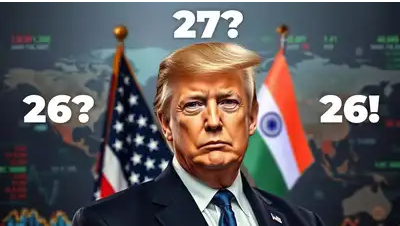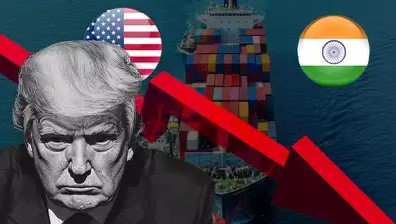Introduction :
On April 2, 2025, former U.S. President Donald Trump unveiled a sweeping new set of tariffs, dubbed the “Liberation Day” tariffs. These aggressive trade measures imposed a minimum 10% duty on imports from all countries, with some nations facing significantly higher rates. China took the hardest hit with a staggering 54% tariff, while the European Union faced 20%, and Australia encountered at least 10% on exports to the U.S.
This sudden shift in trade policy has sent shockwaves through global markets, disrupted international trade relations, and sparked concerns about inflation and economic downturns. But what do these tariffs really mean, and how will they impact the economy?
Breaking Down the Tariffs :
Dubbed as one of the most extensive trade measures in U.S. history, Trump framed the tariffs as a necessary step to counter what he described as “decades of economic manipulation” by foreign nations. Here’s a closer look at the key elements of these tariffs:
- 10% baseline tariff on all imports into the U.S.
- 54% tariff on Chinese goods, targeting alleged unfair trade practices
- 20% tariff on European Union exports, hitting industries like automobiles and technology
- 10% tariff on Canadian and Australian goods, impacting key exports

While the administration argues that these tariffs will protect American jobs, strengthen domestic manufacturing, and reduce the U.S. trade deficit, critics fear they could do more harm than good.
Market Shockwaves: Immediate Economic Fallout :
The announcement of the “Liberation Day” tariffs sent global financial markets into turmoil. Investors braced for economic uncertainty, leading to a significant downturn in stock prices:
- The Dow Jones Industrial Average plummeted 1,200 points, marking one of its worst single-day losses.
- The S&P 500 and Nasdaq Composite suffered substantial declines as tech and retail stocks tumbled.
- Apple, Amazon, and Tesla saw major stock declines due to their heavy reliance on overseas production.
- Retail giants like Walmart and Target warned of potential price hikes, fueling inflation fears.
Automobile manufacturers faced setbacks as the cost of imported parts soared.
Inflation Worries: The Price of Protectionism :
One of the biggest concerns among economists is the inflationary impact of these tariffs. As import costs rise, businesses will likely pass these expenses on to consumers, leading to higher prices on everyday goods.
- Electronics, clothing, and household products are expected to see price hikes.
- Higher tariffs on agricultural imports could push food prices upward.
- Former U.S. Treasury Secretary Larry Summers estimated a potential $30 trillion economic loss over the next decade if these tariffs remain in place.
- Nobel laureate Paul Krugman slammed the move as “irrational and counterproductive.”
Global Backlash: Retaliation on the Horizon :
Unsurprisingly, world leaders have strongly condemned the tariffs, with several nations already preparing countermeasures.

European Union’s Response :
European Commission President Ursula von der Leyen called the tariffs “a serious blow to global economic stability.” In response, the EU is considering imposing retaliatory tariffs on U.S. exports, targeting American agriculture and technology sectors.
China’s Counterattack :
China, the hardest-hit country, announced a 60% tariff on all American imports, affecting key industries such as soybeans, automobiles, and semiconductors. The Chinese government has also hinted at possible restrictions on American businesses operating within China.
Canada & Australia Push Back :
Canadian Prime Minister Mark Carney labeled the tariffs “a tragedy,” signaling potential retaliation on U.S. steel, aluminum, and agricultural exports. Australian leaders echoed similar sentiments, warning that the move could strain relations with long-standing allies.
Political Battle at Home :
The tariffs have ignited fierce debate within the United States, dividing lawmakers along party lines and even within the Republican Party itself.
Republican Infighting :
Some Republicans support the tariffs as a necessary step toward protecting American industries, while others worry about unintended economic consequences. Senate Minority Leader Mitch McConnell warned that “disrupting global trade without strategic foresight can backfire.”
Democratic Opposition :
Democrats have overwhelmingly condemned the tariffs, arguing that they will hurt American consumers and businesses. Senator Elizabeth Warren criticized the policy, stating: “These tariffs are not protecting American workers; they are driving up prices and isolating us from our global partners.”
Technology Sector:
Tech companies, which rely heavily on global supply chains, are particularly vulnerable. Apple, for instance, assembles much of its hardware overseas, meaning potential cost increases could lead to higher consumer prices or shrinking profit margins.
Automotive Industry :
The U.S. auto industry relies on imported parts, and companies like Ford and General Motors have warned that tariffs could drive up vehicle prices and lead to potential job cuts.
Agriculture & Food Prices :
American farmers, who depend on exports to sustain their businesses, are bracing for a financial hit. China’s retaliatory tariff on soybeans could be devastating for Midwestern farmers, further exacerbating trade tensions.
What’s Next? The Road Ahead :
With international backlash mounting and economic concerns escalating, several possible scenarios could play out:
- Negotiation and Rollbacks: The U.S. and affected countries might enter trade talks to revise or soften the tariffs.
- Prolonged Trade War: If retaliatory tariffs continue, a full-scale trade war could significantly disrupt global markets.
- Domestic Pressure: Business leaders and lawmakers may push back, urging the administration to reconsider the policy.
Conclusion :
The “Liberation Day” tariffs mark one of the most aggressive trade policies in modern U.S. history. While supporters argue that they will revitalize American industry, critics warn of dire economic consequences. As markets react and global leaders strategize their responses, the world is watching closely. Will these tariffs reshape international trade, or will they trigger an economic downturn? Only time will tell.
MTG Chapterwise Topicwise DPP NEET Biology (Daily Practice Papers) With Separate Solution Booklet | Mock Test Papers & OMR Sheet | Based on Latest NEET Exam 2025 Pattern [Paperback] MTG Editorial Board

CLICK HERE FOR : BUY
MTG Chapterwise Topicwise DPP NEET Chemistry (Daily Practice Papers) With Separate Solution Booklet | Mock Test Papers & OMR Sheet | Based on Latest NEET Exam 2025 Pattern [Paperback] MTG Editorial Board


